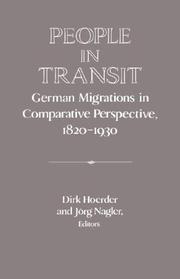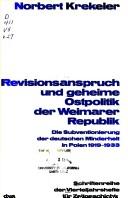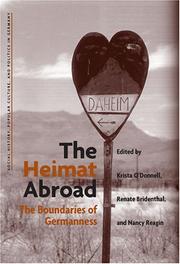| Listing 1 - 10 of 12 | << page >> |
Sort by
|
Periodical
ISSN: 23649321 Publisher: Berlin, Germany : De Gruyter
Abstract | Keywords | Export | Availability | Bookmark
 Loading...
Loading...Choose an application
- Reference Manager
- EndNote
- RefWorks (Direct export to RefWorks)
Germans --- Germans. --- Foreign countries. --- Balkan Peninsula. --- Germans in foreign countries --- Balkan States --- Balkans --- Europe, Southeastern --- Southeastern Europe --- Ethnology --- Europe, Eastern --- Eastern Europe

ISBN: 3129054804 Year: 1973 Volume: Bd. 14 Publisher: Stuttgart : Ernst Klett Verlag,
Abstract | Keywords | Export | Availability | Bookmark
 Loading...
Loading...Choose an application
- Reference Manager
- EndNote
- RefWorks (Direct export to RefWorks)
In der deutschen Geschichte des 19. Jahrhunderts spielte - neben den politischen, sozialen, wirtschaftlichen und technischen Umwälzungen - die natürliche und vor allem die räumliche Bevölkerungsbewegung eine besondere Rolle. Die Problemakik der Wanderungen wird von Peter Marschalck einer theoretischen Analyse unterzogen. Seine Forschungsergebnisse unterscheiden sich von bisher vorliegenden durch eine integrale Betrachtung der Gründe, Strukturen und Folgen der Wanderungen.
Germans in foreign countries --- Germany --- Allemagne --- Emigration and immigration --- History --- Emigration et immigration --- Histoire --- Allemands --- À l'étranger --- Émigration et immigration --- Germans --- -Ethnology --- -History. --- History. --- -Germany
Book

ISBN: 2878548264 2878545001 Year: 2018 Publisher: Paris : Presses Sorbonne Nouvelle,
Abstract | Keywords | Export | Availability | Bookmark
 Loading...
Loading...Choose an application
- Reference Manager
- EndNote
- RefWorks (Direct export to RefWorks)
Au vingtième siècle, l’Allemagne est passée du statut de pays d’émigration à celui de pays d’immigration. L’objet de cet ouvrage est d’analyser, à travers le prisme de l’identité multiple, l’intégration des immigrés allemands à l’étranger ou des immigrés étrangers en Allemagne de manière comparative dans leurs rapports au pays d’origine ou au pays d’accueil, pour déterminer les facteurs d’intégration ou les difficultés rencontrées. Peut-on dégager, en partant d’exemples représentatifs pris dans les divers types de migrations, dans les divers pays d’accueil ou d’origine, des lignes de force communes ? Quels facteurs favorisent un équilibre entre pays d’origine et pays d’accueil ? Quels sont les aspects juridiques, linguistiques, sociologiques, culturels, identitaires qui entrent en jeu ? Les expériences du vingtième siècle peuvent-elles éclairer les problématiques actuelles, en Allemagne comme en France ?
Germans --- Immigrants --- History --- Germany --- Emigration and immigration. --- Social conditions --- Emigrants --- Foreign-born population --- Foreign population --- Foreigners --- Migrants --- Persons --- Germans in foreign countries --- Allemagne --- identité --- intégration --- migration

ISBN: 1139052497 0521474124 0521521920 Year: 1995 Publisher: Cambridge : Cambridge University Press,
Abstract | Keywords | Export | Availability | Bookmark
 Loading...
Loading...Choose an application
- Reference Manager
- EndNote
- RefWorks (Direct export to RefWorks)
The demographic shockwaves of the nineteenth and early twentieth centuries in Europe produced tremendous change in the national economies and affected the political, social, and cultural development of these societies. Migration historians have begun to connect the various European migratory streams during this period with transcontinental migration to North America. This volume contains empirical studies on German in-migration, internal migration, and transatlantic emigration from the 1820s to the 1930s, placed in a comparative perspective of Polish, Swedish, and Irish migration to North America. Special emphasis is placed on the role of women in the process of migration. By looking specifically at postwar Germany, Klaus J. Bade underscores the relevance of this history in a concluding essay.
German Americans --- Germans --- Regions & Countries - Europe --- History & Archaeology --- Germany --- Ethnology --- Germans in foreign countries --- History. --- History --- United States --- Emigration and immigration --- Arts and Humanities

ISBN: 3421016674 3486703587 Year: 1973 Publisher: De Gruyter
Abstract | Keywords | Export | Availability | Bookmark
 Loading...
Loading...Choose an application
- Reference Manager
- EndNote
- RefWorks (Direct export to RefWorks)
Die Revision der Ostgrenzen Deutschlands, wie sie der Versailler Vertrag geschaffen hatte, galt allen Regierungen der Weimarer Republik - unabhängig von ihrer politischen Zusammensetzung - als eines der wichtigsten Ziele deutscher Außenpolitik. Die Grenze im Osten durfte nie aufhören, ein Problem zu sein, und das konnte am besten dadurch erreicht werden, dass die deutsche Minorität in den abgetretenen Territorien nach ihrer Zahl wie nach ihrer wirtschaftlichen Bedeutung ein beachtlicher Faktor blieb und überdies in wirtschaftlich-politischer Abhängigkeit von Berlin gehalten wurde. Wer organisierte die notwendig geheime Wirtschaftshilfe, die jene Abhängigkeit sicherte? Woher kamen die Mittel? Wie sind die Gelder nach Polen geschleust worden? Auf dies Fragen gibt Norbert Krekeler, gestützt auf bislang unbekannte Quellen, schlüssige Antworten. In seiner Studie präsentiert er eines der faszinierendsten Kapitel Weimarer Geheimpolitik, die im Übrigen von den Kabinetten der Republik nicht allein gegen ausländische Interventionen, sondern auch gegen das eigene Parlament und die deutsche Öffentlichkeit sorgsam abgeschirmt worden ist und bis heute unbekannt blieb. Krekeler zeigt, wie unter der Ägide des Auswärtigen Amts und anderer Regierungsstellen bereits 1920 der Kern des Apparats entstand, der zwar mit Reichmitteln arbeitete, dessen privater Charakter jedoch außenpolitische Verwicklungen ausschloss und die potentiellen innenpolitischen Kritiker ebenfalls täuschte. Nur dieser umfangreiche Apparat erhielt, vom Reichstag und der Öffentlichkeit unkontrolliert, die deutsche Minderheit in Polen als eine Größe, die der außenpolitischen Revisionsforderung eine gewisse Basis bot. Der Apparat funktionierte so gut, dass ihn die Nationalsozialisten unverändert übernahmen.
Germany. Auswartiges Amt --- Germans --- Germany. --- International relations. --- Germans in foreign countries --- Germany (West). --- Prussia (Kingdom). --- Coexistence --- Foreign affairs --- Foreign policy --- Foreign relations --- Global governance --- Interdependence of nations --- International affairs --- Peaceful coexistence --- World order --- National security --- Sovereignty --- World politics
Book
ISBN: 3922641393 9783922641391 Year: 1989 Publisher: Mannheim: Institut für deutsche Sprache,
Abstract | Keywords | Export | Availability | Bookmark
 Loading...
Loading...Choose an application
- Reference Manager
- EndNote
- RefWorks (Direct export to RefWorks)
German language --- Sociolinguistics --- Germans --- -Germans --- -Ethnology --- Ashkenazic German language --- Hochdeutsch --- Judaeo-German language (German) --- Judendeutsch language --- Judeo-German language (German) --- Jüdisch-Deutsch language --- Jüdischdeutsch language --- Germanic languages --- Foreign countries --- Duitstalig België --- Duitstalige minderheden --- taalsituatie en taalpolitiek --- -Foreign countries --- Duitstalige minderheden. --- taalsituatie en taalpolitiek. --- -Ashkenazic German language --- Germans in foreign countries --- German language - Foreign countries. --- Germans - Foreign countries. --- Sprachminderheiten
Book
ISBN: 3406359612 Year: 1992 Publisher: München Beck
Abstract | Keywords | Export | Availability | Bookmark
 Loading...
Loading...Choose an application
- Reference Manager
- EndNote
- RefWorks (Direct export to RefWorks)
Immigrants --- -Minorities --- -Ethnic minorities --- Foreign population --- Minority groups --- Persons --- Assimilation (Sociology) --- Discrimination --- Ethnic relations --- Majorities --- Plebiscite --- Race relations --- Segregation --- Emigrants --- Foreign-born population --- Foreigners --- Migrants --- Aliens --- Germany --- Emigration and immigration. --- Ethnic relations. --- -Germany --- -Germans --- Allemands à l'étranger --- Allemands à l'étranger --- History of Germany and Austria --- Germans --- Minorities --- Germans in foreign countries --- Minorités --- Allemagne --- Emigration et immigration --- Relations interethniques

ISBN: 2213602131 9782213602134 Year: 1999 Publisher: Paris: Fayard,
Abstract | Keywords | Export | Availability | Bookmark
 Loading...
Loading...Choose an application
- Reference Manager
- EndNote
- RefWorks (Direct export to RefWorks)
"Les abominations du nazisme sont-elles le fruit d'un tragique enchaînement de circonstances, ou bien la culture politique allemande les portait-elle, fût-ce en germe, depuis des décennies? À ce débat qui n'en finit pas de rebondir, le présent livre apporte une contribution décisive. "L'Allemagne au-dessus de tout" : le slogan ne date pas des lendemains de la défaite de 1918, mais bien de ceux de la victoire de 1871... A partir des années 1890, se développe dans les milieux intellectuels et les classes dirigeantes un puissant groupe de pression, la Ligue pangermaniste, qui entretient inlassablement dans l'opinion et les sphères politiques la peur et la frustration. Créatrice du nationalisme bourgeois moderne, elle prône la méfiance à l'endroit de toute population réputée allogène, réclame sans relâche la "réorganisation" de l'Autriche-Hongrie, revendique la construction d'un empire colonial cohérent et d'une marine surpuissante, elle exige une protection militante des minorités allemandes d'Europe centrale, la germanisation forcée en Pologne ou en Lorraine occupée, l'annexion ou la vassalisation de territoires multiples, invente le concept de déportation en masse. Ses chefs ont enraciné les complexes d'infériorité et/ou de supériorité d'une nation fragile encore, beaucoup plus fraîchement constituée que ses voisines anglaise et française, et l'ont lancée dans des rêves de puissance que Bismarck lui-même n'avait pas osé caresser. À l'issue de la Première Guerre mondiale, les obsessions pangermanistes empêcheront les Allemands et leurs élites de surmonter leur défaite et ouvriront la voie à une nouvelle révolution, menée par des groupes plus radicaux encore, qui ne craindront ni de se salir les mains ni d'opérer au grand jour. En ce sens, même si elles ne l'ont pas directement enfanté, elles ont rendu le nazisme possible."--Page 4 de la couverture.
Pan-Germanism --- Pangermanism --- Pangermanisme --- Germany --- Allemagne --- Politics and government --- Politique et gouvernement --- National characteristics, German --- Nationalism --- Germany XIX-XXth Century --- History --- 19th century --- 20th century --- Nationalism - Germany --- Germany - Politics and government - 1888-1918 --- Germany - Politics and government - 1918-1933 --- Germany - Politics and government - 1933-1945 --- Germans --- German national characteristics --- Germans in foreign countries --- Third Reich, 1933-1945 --- Weimar Republic, Germany, 1918-1933 --- PANGERMANISME --- ALLEMAGNE --- NATIONALISME --- HISTOIRE --- 19E-20E SIECLES

ISBN: 0826473245 Year: 2004 Publisher: London Continuum
Abstract | Keywords | Export | Availability | Bookmark
 Loading...
Loading...Choose an application
- Reference Manager
- EndNote
- RefWorks (Direct export to RefWorks)
Germans --- Intellectuals --- Political refugees --- History --- Intelligentsia --- Persons --- Social classes --- Specialists --- Germans in foreign countries --- Asylum seekers --- Refugees, Political --- Refugees --- Deutsche Akademie im Exil --- Deutsche Akademie zu New York --- Deutsche Akademie der Künste und Wissenschaften im Exil --- History. --- Austria --- Germany --- Ao-ti-li --- Ostmark --- Alpen- und Donau-Reichsgaue --- al-Nimsā --- Ausztria --- Østrig --- Avusturya --- Österreich --- Avstrii︠a︡ --- Autriche (Republic) --- Rakousko --- Deutschösterreich --- German Austria --- Republik Österreich --- Austrian Republic --- Avstrija --- Republic of Austria --- オーストリア --- Ōsutoria --- אוסטריה --- Osṭriyah --- Austro-Hungarian Monarchy --- Holy Roman Empire --- Emigration and immigration.

ISBN: 1282593919 9786612593918 0472025120 9780472025121 0472030671 0472114913 9780472030675 9780472114917 Year: 2005 Publisher: Ann Arbor
Abstract | Keywords | Export | Availability | Bookmark
 Loading...
Loading...Choose an application
- Reference Manager
- EndNote
- RefWorks (Direct export to RefWorks)
Germans -- Foreign countries. --- Germany -- Emigration and immigration. --- Jews, German -- Foreign countries. --- Population transfers -- Germans. --- Germans --- Jews, German --- Population transfers --- Regions & Countries - Europe --- Germany --- History & Archaeology --- Cleansing, Ethnic --- Ethnic cleansing --- Ethnic purification --- Exchange of population --- Exchanges, Population --- Interchange of population --- Interchanges, Population --- Population exchanges --- Population interchanges --- Purification, Ethnic --- Transfer of population --- Transfers, Population --- Emigration and immigration --- Minorities --- German Jews --- Germans in foreign countries --- Emigration and immigration. --- Germans. --- Immigration --- International migration --- Migration, International --- Population geography --- Assimilation (Sociology) --- Colonization --- Allemands --- Juifs allemands --- SOCIAL SCIENCE --- HISTORY --- Auswanderung. --- Ausland. --- Kulturelle Identität. --- Heimatgefühl. --- Duitsers. --- Immigratie. --- Joden. --- Emigratie. --- Anthropology --- Cultural. --- Discrimination & Race Relations. --- Minority Studies. --- General. --- Foreign countries. --- Allemagne --- Germany. --- Deutschland. --- USA. --- Juden. --- Deutsche. --- Émigration et immigration.
| Listing 1 - 10 of 12 | << page >> |
Sort by
|

 Search
Search Feedback
Feedback About UniCat
About UniCat  Help
Help News
News